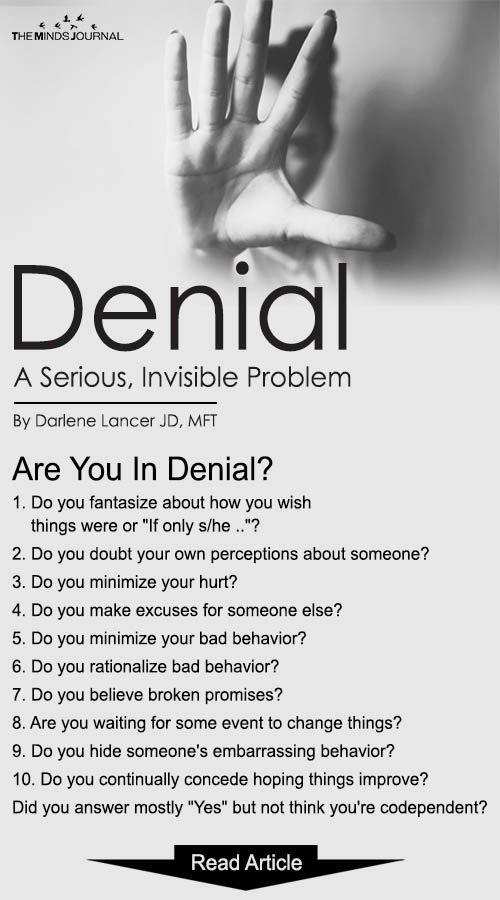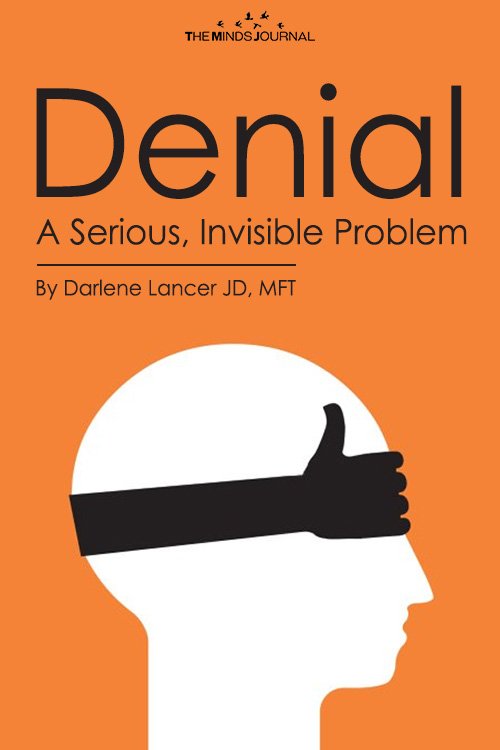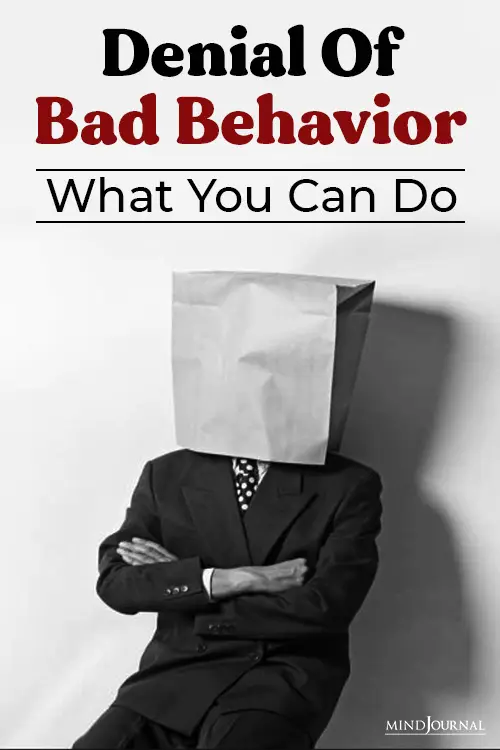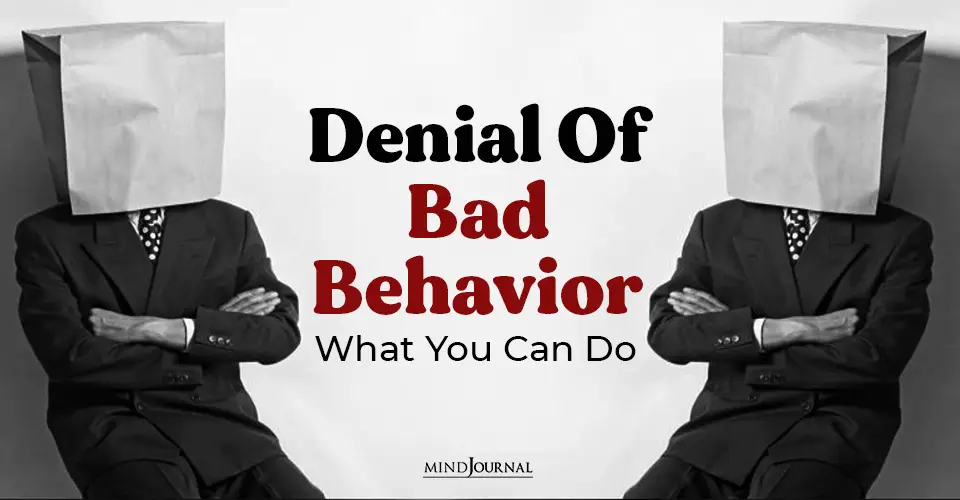Denial is serious. It’s a refusal to acknowledge truth or reality. Sometimes, denial of bad behavior has benefits, but it can also be our undoing and can have life-threatening consequences.
It affects not only individuals. “Group-think” can be particularly dangerous on a group level. Sub-cultures, religious sects, organizations, and political zealots can deny abuse, addiction, racism, genocide, corruption, and criminality. We can deny positive input as well as negative.
Denial can restrict us from expressing our rights, our power, and our abilities, diminishing our self-esteem and capacity to pursue our goals.
Denial may be conscious but is usually unconscious. We all do it. We not only deceive ourselves, we forget, excuse, rationalize, and minimize.
We might be aware of the facts, but deny or minimize the consequences, or even acknowledge them, but stubbornly refuse to change or get help. It can be tricky to uncover something that is unconscious.
Read: 2 Reasons Why The Abuser Blames You Even When You Are The Victim
Why we deny
Denial is the first and simplest psychological defense mechanism.
Typically, children deny wrongdoing to avoid reprimand. I recall my 4-year old shaking his head while denying from the chocolate-smeared mouth that he’d eaten ice cream in the wee morning hours. Adults deny wrongdoing, too, notably politicians, criminals, abusers, addicts, and adulterers.
Conscious lies are usually motivated by self-preservation and fear of punishment. While not admirable, they’re understandable, though less sympathetic when motivated by a quest for power. What’s more troublesome is our denial in believing them.
Our brain is wired for survival, and denial serves that function.
There are many reasons for denial of bad behavior, including avoidance of physical or emotional pain. Denial is adaptive when it helps us cope with difficult emotions, as in the initial stages of grief following the loss of a loved one, particularly if the separation or death is sudden.
Denial of bad behavior allows our body-mind to adjust to the shock more gradually.
Denial also builds cohesion, especially between loved ones.
It’s a unifying force between spouses, and among families, groups, or political parties. We overlook things that might that might cause arguments, hurt, or separation.
One study showed that people will forgive a member of a clique four to five times more than a stranger. Idealization supports denial and blinds us to anything that would mar respect for a partner, family or group member, or leader.
Read The Narcissist Blames You! It’s ALWAYS Your Fault
We deny reality to maintain the status quo due to fear of change and the unknown.
For this reason, people believe the demonization of immigrants, or other races, or religions. If we favor a politician or love a cheating or abusive partner, we may ignore truths that would create disillusionment and/or require us to struggle with uncomfortable feelings and what to do.
A deceived spouse might prefer to believe lies rather than confront an intolerable situation that is not only painful, but that could lead to unwanted consequences, like divorce.
We will defend untruths and blatant lies of people we want to believe. We tend to distrust information that’s contrary to our beliefs (including unconscious ones), and even double down to reduce inner conflict or “cognitive dissonance.” This process is termed motivated reasoning that helps regulate emotion. We consciously and unconsciously select the information that affirms our beliefs and disregards facts that don’t.
When we have internalized shame, we will do the same with positive feedback that is incongruent with internal negative beliefs about ourselves. Low self-esteem makes it difficult to receive a compliment, praise, and love. If we believe that we don’t deserve it, our minds can actually twist a compliment into criticism, and we can’t be convinced otherwise!
Shame breeds denial in both victims and liars. It’s a major cause of unreported abuse – why victims don’t disclose, minimize, and deny it and why addicts don’t seek help. We might ignore our mounting debt to avoid the same of admitting it and having to lower our spending or standard of living.
A parent might look the other way to avoid accepting responsibility when his child is bullying peers or getting high. Facing the truth can expose us to pain, possible loss, and shame about our own behavior or shortcomings.
Read 11 Promises You Should Make to Yourself and Keep
When we are trained to deny
Unbelievably, as children we’re often trained to deny our perceptions.
Parents routinely contradict children’s perceptions to manipulate them, to protect another family member, or to hide family secrets, such as addiction; e.g. “Daddy (who’s passed out) wants to play with you; he’s just tired,” or “That movie isn’t playing anymore (even though it clearly is),” or “Your brother didn’t mean to hit you.”
Parents also deny children’s needs and feelings, telling them they don’t or shouldn’t feel a certain way or need or want something.
Children idealize their parents and must adapt to survive. They blame themselves and learn to doubt or deny perceptions, feelings, wants, and needs. This can lead to toxic shame that unconsciously colors their entire adult lives. Some people repress or deny their past and insist they had a happy childhood to avoid painful truths.
We also deny problems that grew up around. We won’t realize that something is wrong. If we were emotionally abused as a child, we might not recognize abuse or object to mistreatment.
We’d likely take the blame, or minimize, excuse, or rationalize it, e.g. “It’s my fault,” “It’s enough that she loves me,” “My husband doesn’t mean it,” or “My wife just has a temper.” If we were molested, we might not notice or protect our child who’s being incested.
Read Invalidation and Narcissism: Why They Slowly Erase You
If we grew up with alcoholism, we might normalize our spouse’s or our own alcohol addiction. Denial affects future generations and can cause families and entire groups to endure decades of shame that’s hard to reverse. When we face the truth, we can seek help and interrupt that legacy.
How we’re harmed
When we deny negative feelings and memories, it deadens our senses. All our feelings get suppressed, including joy and love.
We become increasingly numb as our heart closes. Similarly, when we deny our wants and needs, our enjoyment of life diminishes. We sacrifice our desires and live in quiet desperation. Denial of our value prevents us from receiving love and achieving our goals or gaining any satisfaction from our successes.
Moreover, when we repeatedly tune out reality, problems grow. Sweeping something important under the rug makes it harder to correct later. Many people afraid of cancer delay getting biopsies, even though early intervention leads to better outcomes. The same is true for treating mental health and marital problems.
Read Six Tips for Speaking Up Against Bad Behavior
Our psyche knows the truth, and our discomfort might manifest as passive-aggressive or addictive behaviour, displaced anger (yelling at our children instead of our spouse), or as a physical or mental health problem. Research shows that denial of stress and negative emotions have serious health risks that can lead to heart attacks, surgery, and death.
When a society denies racism, corruption, immorality, or abuse of power, institutions are at risk. Like individuals, societies sicken. People become numb, develop a sense of futility, and a downward spiral ensues that allows the worst in human nature.
How to change
Change requires courage and a desire to live in truth. We often need support, especially when the fear of facing something or someone is great.
Fear of shame causes needless anxiety. It’s not a good reason to delay, because we can overcome shame. If we’re in denial because of guilt, we can forgive ourselves and make amends to others. This builds self-esteem.
- Become more mindful through meditating and journaling.
- When you have a knee-jerk reaction to opposing views, take a breath. You don’t have to agree but listen to alternative opinions and interpretations of facts. Look at all the facts.
- Challenge your underlying assumptions. Where do your beliefs come from? Are they helpful? Might reasonable people disagree?
- Are you having wishful thinking about a problem when the facts prove otherwise?
- Do you excuse, rationalize, or minimize a problem or conceal it from others? (Take the quiz in Codependency for Dummies.)
- Don’t bury problems, and assume no one notices. Instead, be willing to initiate difficult conversations about uncomfortable subjects.
- Take constructive action to reduce worry and stress.
- Don’t procrastinate. Talk to a professional about your concerns.
©Darlene Lancer 2018
Written by Darlene Lancer JD, MFT
Republished with permission.











Leave a Reply
You must be logged in to post a comment.